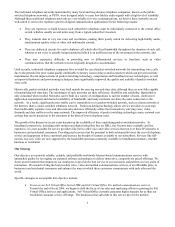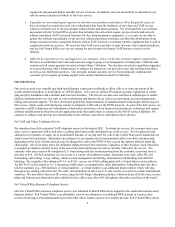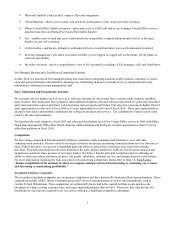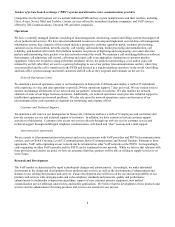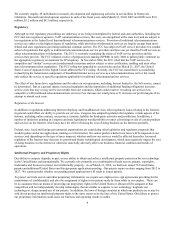8x8 2010 Annual Report Download - page 15
Download and view the complete annual report
Please find page 15 of the 2010 8x8 annual report below. You can navigate through the pages in the report by either clicking on the pages listed below, or by using the keyword search tool below to find specific information within the annual report.13
On the other hand, the FCC is seeking to reform the federal universal service fund that is applicable to us. The way we
calculate our contribution may change if the FCC engages in such reform. While we cannot predict how or if the FCC will
reform the contribution mechanism for the universal service fund, nor can we determine the impact on our business at this time,
should the FCC adopt a new federal universal service fund contribution mechanism that increases our contribution obligation,
we will either need to raise the amount we currently collect from our customers to cover this obligation or reduce our profit
margins. Furthermore, certain states continue to attempt to apply state universal service fund obligations on our service though
we do not believe that the current state of the law requires us to make such contributions. Recently, two states, Kansas and
Nebraska, filed a petition with the FCC seeking the authority to impose state universal service fund contribution obligations on
our service and also sought retroactive application of such authority. We cannot predict the outcome of this proceeding, nor
can we determine the impact on our business at this time. Should the FCC allow states to impose state universal service fund
obligations on our nomadic interconnected VoIP service, we would pass any increased cost of state universal service fund
contributions through to our customers. Our services may become less competitive with other providers should we raise the
price customers ultimately pay for the services we offer to cover these additional regulatory costs.
We may become subject to state regulation for certain service offerings.
Certain states take the position that offerings by VoIP companies, like us, are intrastate and therefore subject to state regulation.
These states argue that if the beginning and end points of communications are known, and if some of these communications
occur entirely within the boundaries of a state, the state can regulate that offering. We believe that the FCC has pre-empted
states from regulating VoIP offerings. We cannot predict how this issue will be resolved or its impact on our business at this
time.
We rely on third party network service providers to originate and terminate substantially all of our public switched
telephone network calls.
We leverage the infrastructure of third party network service providers to provide telephone numbers, PSTN call termination
and origination services, and local number portability for our customers rather than deploying our own network throughout the
United States. This decision has resulted in lower capital and operating costs for our business in the short term but has reduced
our operating flexibility and ability to make timely service changes. If any of these network service providers cease operations
or otherwise terminate the services that we depend on, the delay in switching our technology to another network service
provider, if available, and qualifying this new service could have a material adverse effect on our business, financial condition
or operating results.
While we believe that relations with our current service providers are good and we have contracts in place, there can be no
assurance that these service providers will be able or willing to supply cost-effective services to us in the future or that we will
be successful in signing up alternative or additional providers. While we believe that we could replace our current providers, if
necessary, our ability to provide service to our subscribers could be impacted during this timeframe, and this could have an
adverse effect on our business, financial condition or results of operations. The loss of access to, or requirement to change, the
telephone numbers we provide to our customers also could have a material adverse effect on our business, financial condition
or operating results.
Due to our reliance on these service providers, when problems occur in a network, it may be difficult to identify the source of
the problem. The occurrence of hardware and software errors, whether caused by our 8x8 service or another vendor’s
products, may result in the delay or loss of market acceptance of our products and any necessary revisions may force us to
incur significant expenses. The occurrence of some of these types of problems may seriously harm our business, financial
condition or operating results.
Intense competition in the markets in which we compete could prevent us from increasing or sustaining our revenue
and increasing or maintaining profitability.
The telecommunications industry is highly competitive. We face intense competition from traditional telephone companies,
wireless companies, cable companies, competitive local exchange carriers, alternative voice communication providers and
independent VoIP providers.
Most of our current and potential competitors have longer operating histories, significantly greater resources and name
recognition, and a larger base of customers than we have. As a result, these competitors may have greater credibility with our
existing and potential customers. They also may be able to adopt more aggressive pricing policies and devote greater resources
to the development, promotion and sale of their products than we can to ours. Our competitors may also offer bundled service


